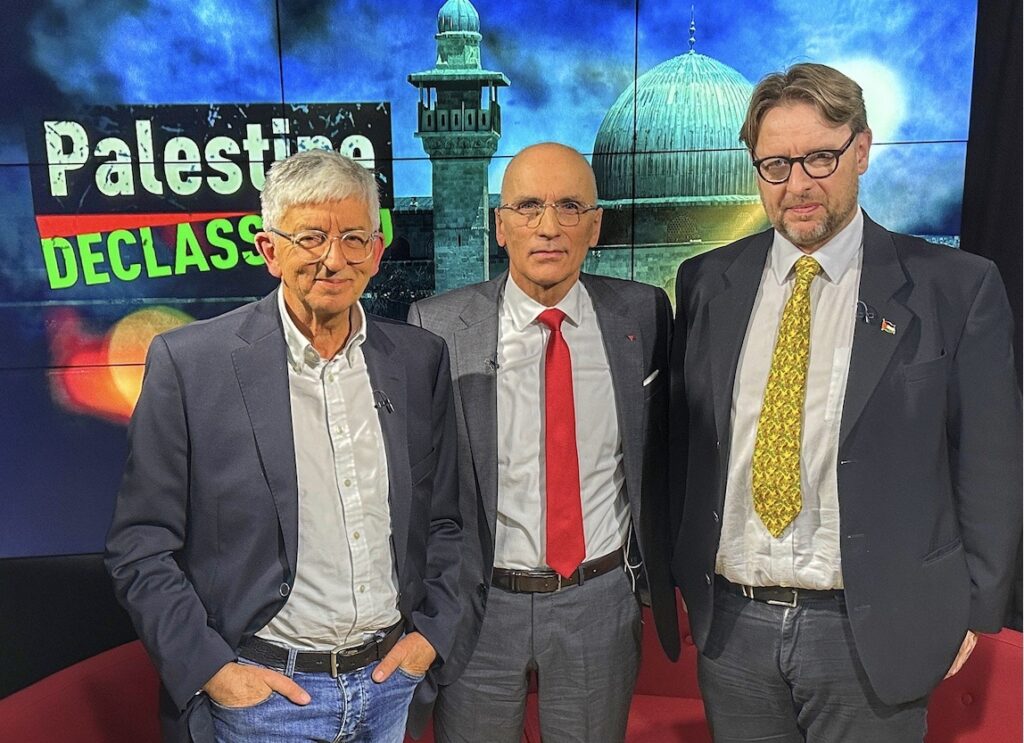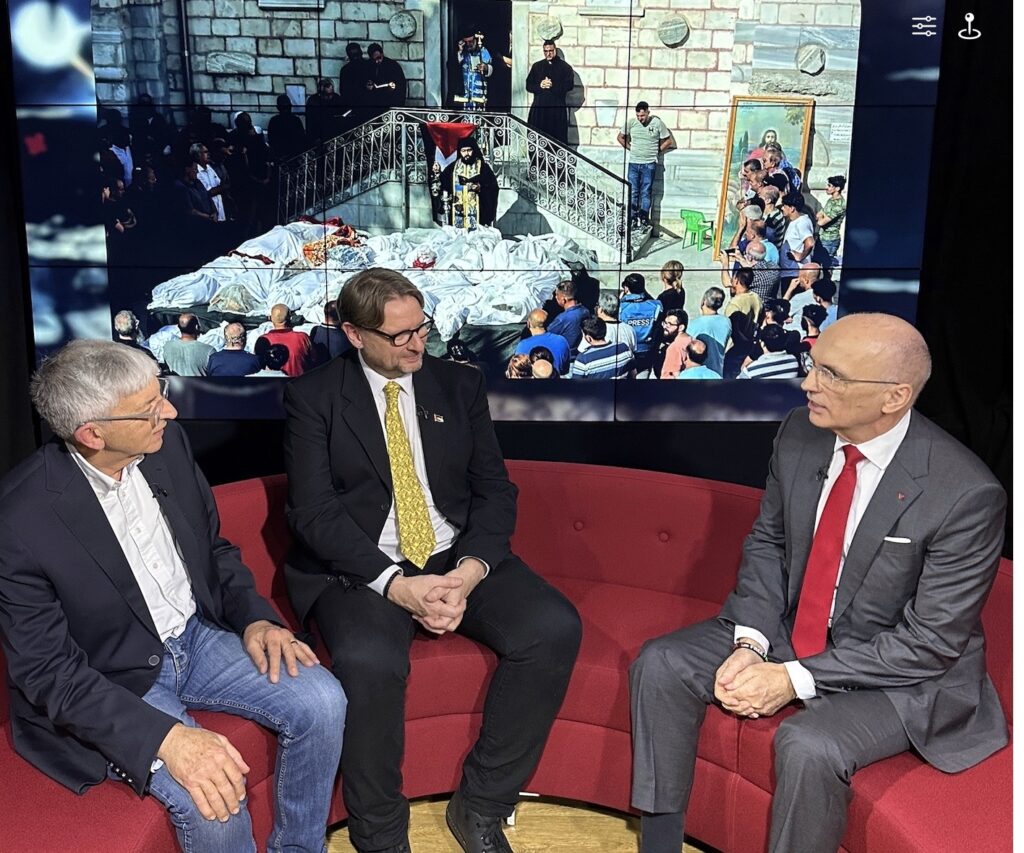
Jesus of Palestine: In conversation with Chris Williamson and David Miller on Palestine Declassified for Press TV. View the interview here:
What’s your view on Jesus’ politics?
In his first sermon Jesus announced his political agenda.
“The Spirit of the Lord is on me,
because he has anointed me
to proclaim good news to the poor.
He has sent me to proclaim freedom for the prisoners
and recovery of sight for the blind,
to set the oppressed free, to proclaim the year of the Lord’s favour.”
Then he rolled up the scroll, gave it back to the attendant and sat down. The eyes of everyone in the synagogue were fastened on him. 21 He began by saying to them, “Today this scripture is fulfilled in your hearing.” (Luke 4:18-21; Isaiah 61:1-2)
The prophet Isaiah is referring to the coming of the Messiah to announce the Year of Jubilee (which occurred every 50 years). When debts were cancelled, all slaves were freed and any property sold was returned to each family. It was intended to avoid extremes of wealth and poverty, and ensure justice, liberty, and equality. Jesus insists the Jubilee had come because the Sovereign King had now arrived. Jesus political agenda therefore was to transform a deeply divided and unjust world and bring liberty, equality and fraternity, in a right relationship with the one true God and one another. Although this will ultimately only be fully realised in heaven, we get to demonstrate a foretaste by the way we treat one another.
‘Why were Jesus political statements so controversial’?
Jesus was controversial because he challenged those in power and those who wanted to take power in a unique way. Jesus rejected the three ways people typically respond to injustice and oppression. What ae they? First, violent resistance (the Zealots equate to Hamas today). Second, passive acquiescence (the majority who have their heads in the sand), and third, collaboration (Herod and the Pharisees who equate to the Palestinian Authority and our Western governments today who collaborate with apartheid Israel). Jesus was different: he did not resist the Roman occupation of Palestine, but instead undermined it. He undermined the occupation by placing God above the occupying power and by using love to abolish the distinction between occupier and occupied. He undermined it by challenging religious authorities that were accommodating the occupation and by presenting an alternative vision of heaven on earth so compelling it would eventually win over both occupied and the occupiers…He fought Roman rule through sacrificial love… Christians believe, ultimately sacrificing himself to save the world. That is why Christ followers are called to be peacemakers.
Tell us about your take on Christ throwing the money changers and merchants out of the Temple?
Orthodox Jews regard Jesus as a charlatan. Muslims recognise Jesus as a prophet. Christians believe Jesus is divine, the Son of God. Most secular people see Jesus as a good man – maybe a great moral teacher. Gentle Jesus, meek and mild. But in the Gospels we encounter a very different Jesus. A Jesus who is militant, untamed, unpredictable. Jesus mean and wild – even terrifying. This is especially true as he spoke truth to power and exposed the hypocrisy and corruption of those in authority.
The temple was intended to be the place where people of all nations could meet with God. But to enter, pilgrims had a pay a temple tax using a special coin minted in Tyre because of its high silver content. Money changers in the Temple exchanged foreign money at exorbitant exchange rates. But the priests would also force pilgrims to purchase animals to sacrifice provided by temple traders. So they were fleeced twice. No wonder Jesus condemns this exploitation. Jesus made a whip and drove out the money changes and animal traders from the Temple. “My house will be called a house of prayer for all nations” If this is how Jesus reacted then, we do not have to speculate about how Jesus will respond to those who advocate supremacism, segregation and apartheid. Especially those who bomb places of worship and murder refugees sheltering in them.
Does the Zionist onslaught against Palestinian Christians constitute a genocide in your opinion?
Yes indeed, unequivocally. It is not surprising that the small Christian community in Gaza has seen their churches, schools and hospitals attacked. Just as in the West Bank, the presence of an indigenous Palestinian Christian community calling for liberation from oppression challenges the racist agenda of Israel. Their presence challenges the Christian Zionist narrative which seeks to defend and justify the barbaric behaviour of Israel. Israel wants to portray this as a conflict between Jews and Muslims to ensure Christians around the world will side with them against Muslims. Palestinian Christians see Muslims as their sisters and brothers and refuse to be divided. They repudiate this supremacism and racism and so they are targeted. Ironically, in the Christmas story we learn that when King Herod heard that the King of the Jews had been born in Bethlehem, he ordered the murder of all the boys under two years of age in Bethlehem. Jesus and his parents escaped and sought asylum in Egypt. This also speaks into what is happening in Gaza. Gaza is a constant reminder to the Israelis that they built their settler colonial apartheid state on Palestinian soil. The murder of thousands of children in Gaza is nothing less than genocide and ethnic cleansing. Israel is attempting to erase Palestine. And there is a very real threat that the Israelis will force the people of Gaza into the Egyptian desert just like Mary and Joseph and their baby son.

You’ve just heard in our video report about two women civilians taking refuge in a church being killed by an Israeli sniper. Would you say that’s unusual in war?
There are always sadly civilian casualties in war. But there is a difference when civilians are targeted. This is one of the criteria for war crimes charges. The Latin Patriarch issued this statement following the murder of Nahida and her daughter Samar.
“Around noon today, December 2023,16 a sniper of the IDF murdered two Christian women inside the Holy Family Parish in Gaza, where the majority of Christian families has taken refuge since the start of the war. Nahida and her daughter Samar were shot and killed as they walked to the Sister’s Convent.
One was killed as she tried to carry the other to safety. Seven more people were shot and wounded as they tried to protect others inside the church compound. No warning was given, no notification was provided. They were shot in cold blood inside the premises of the Parish, where there are no belligerents.
Earlier in the morning, a rocket fired from an IDF tank targeted the Convent of the Sisters of Mother Theresa. The Convent is home to 54 disabled persons and is part of the church compound, which was signaled as a place of worship since the beginning of the war. Two more rockets, fired by an IDF tank, targeted the same Convent and rendered the home uninhabitable.
The 54 disabled persons are currently displaced and without access to the respirators that some of them need to survive.”
These are war crimes and Israel must be held to account.
What would your message be to Christians watching this horror unfold at Christmas time?
The Lutheran Christmas Church in Bethlehem have created a nativity scene resembling the situation in Gaza amid Israel’s brutal onslaught. The nativity scene shows a baby wrapped in the traditional Palestinian keffiyeh and placed in debris and rubble. While the keffiyeh symbolises Palestinian identity, history, and struggle, the debris represents destruction in Gaza, where at least 20,000 people have already been killed by Israel’s indiscriminate war, and thousands more are missing under the rubble, most of them children and women. The baby Jesus represents the thousands of children murdered and buried beneath the rubble in Gaza. The vicar of the Nativity Church, the Revd Dr Munther Isaac, said: “If Jesus were born today, he would be born in Gaza under the rubble.” The municipalities and churches in Bethlehem and Ramallah have announced that Christmas celebrations have been cancelled in the occupied West Bank in solidarity with Gaza, calling on parishes instead to collect donations to help the victims. Howard Thurman was an influential African American author, theologian, and civil rights leader. He also wrote a poem called the Work of Christmas.
“When the song of the angels is stilled,
When the star in the sky is gone,
When the kings and princes are home,
When the shepherds are back with their flock, The work of Christmas begins: To find the lost, To heal the broken, To feed the hungry, To release the prisoner, To rebuild the nations,
To bring peace among people, To make music in the heart.”
